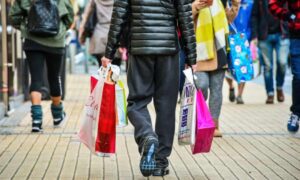
Spending in shops and online bounced back strongly last month as better weather, falling inflation and rising consumer confidence boosted spending.
The monthly update from the Office for National Statistics showed the volume of retail sales rose by 2.9% in May, after a weather-affected drop of 1.8% in April.
The ONS said most retailers had a better month in May, with marked increases in the clothing and footwear and household goods sectors. Clothing sales rose by 5.4% as retailers managed to shift summer stock.
Kathleen Brooks, a research director at XTB, said the strength of clothing sales might have been influenced by one-off events. “Could this be the Taylor Swift effect, with people – including myself – splurging on new outfits ahead of her Eras tour, the UK leg of which is set to add £1bn to the UK economy?”
The official data followed the release of the latest snapshot of consumer confidence from GfK showing sentiment standing at its highest level in two and a half years.
Over the three months to May – a better guide to the underlying trend in spending – retail sales rose by 1%. Even so, they remained 0.5% below the level immediately before the start of the Covid pandemic in February 2020.
Retail sales account for less than half of total consumer spending and exclude categories such as car sales, eating out and hotel stays.
The broader monthly health check on the economy by S&P found the pace of growth eased in June after Rishi Sunak called a snap election.
The S&P purchasing managers’ index showed activity was growing at its slowest pace in seven months, with the weakness concentrated in the service sector.
Chris Williamson, the chief business economist at S&P Global Market Intelligence, said: “Flash PMI survey data for June signal a slowing in the pace of economic growth, indicating that GDP is now growing at a sluggish quarterly rate of just over 0.1%.
“The slowdown in part reflects uncertainty around the business environment in the lead-up to the general election, with many firms seeing a hiatus in decision-making pending clarity on various policies.”
The PMI composite output index fell from 53.0 in May to 51.7 in June. A reading above 50 indicates the economy is expanding rather than contracting.
Rob Wood, the chief UK economist at Pantheon Macro, said the fall in the PMI was an election-related blip. “Retail sales rebounded strongly from April’s rain-sodden disaster and will keep gaining ground as consumers’ real wage growth drives higher spending.
